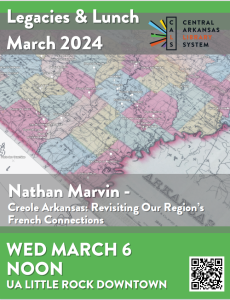Events

- This event has passed.
CALS Legacies & Lunch- Creole Arkansas: Revisiting Our Region’s French Connections
March 6 at 12:00 pm - 1:00 pm
Join us on March 6th at noon for Central Arkansas Library System’s Legacies & Lunch program with UA Little Rock History Department’s Dr. Nate Marvin as he speaks on “Creole Arkansas: Revisiting Our Region’s French Connections.”
CALS Legacies & Lunch March 2024
Wednesday, March 6, 2024 at 12 pm
UA Little Rock Downtown, 333 President Clinton, Ave.

Two new projects at the University of Arkansas at Little Rock are bringing fresh perspectives to the connections between Arkansas and French history.
First, the product of an international partnership between UA Little Rock Downtown and the Villèle Historical Museum on the French island of Réunion, a new exhibit puts two influential mid-nineteenth-century freedom lawsuits into conversation: that of Abby Guy, in Arkansas, and Furcy Madeleine, on Réunion. The exhibit, “Slavery and Freedom: Journeys Across Time and Space,” shows how these two courtroom battles challenge our received wisdom about race, family, and the law in slave societies and prompt us to reconsider the meaning of “freedom” itself.
Second, a new digital history project, “Arkansas Creole,” based on new archival findings, reexamines local place names—Petit Jean, Shinall Mountain, Thibault Road, and Bayou Bartholomew—to uncover the real historical figures behind them. Their stories, obscured by decades of mythmaking, are emblematic of the cosmopolitan French-speaking community that persisted in this region long after the Louisiana Purchase. The world of Creole Arkansas was diverse, composed of people with origins across North America, Europe, Africa, and the Caribbean, many of whom were of mixed ancestry. A fuller understanding of Arkansas’s “French” heritage can help foster a more meaningful sense of place for residents of the state today.
Nathan Marvin is an assistant professor of European history at UA Little Rock. His research, focusing on slavery and resistance in the French colonial world, has been supported by the Camargo Foundation, the American Society for Eighteenth-Century Studies, and a Mellon Fellowship from the Social Science Research Council.